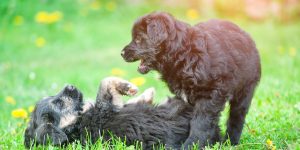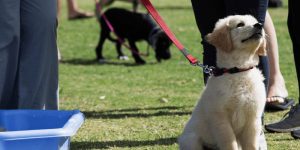Puppy Training – How To Stop Biting And Nipping In Puppies.
It is perfectly natural for young puppies to investigate and explore the world around them using their mouths. Litter mates will frequently play with one another by mouthing, chewing and biting. So, when puppies begin living with their new human families, they see no reason why they shouldn’t play in the same way! This Holidays 4 Dogs article will provide a few hints and tips on what to do about exuberant nipping and biting by enthusiastic pups.
Why do puppies bite and nip?
If you observe a litter of puppies and their mother, you may notice that when one puppy gets too rough, either with one of his litter mates or his mother, the ‘injured’ party will let out a high pitched yelp.
observe a litter of puppies and their mother, you may notice that when one puppy gets too rough, either with one of his litter mates or his mother, the ‘injured’ party will let out a high pitched yelp.
More often than not, this will startle the cheeky pup and stop him in his, or her, tracks. The puppy that has been bitten too hard, will then stop playing and move away.
Puppies learn how to read other dog’s body language when they are still in the nest.
However, it is up to us to continue this education, once they move into a human dominated home.
Bite inhibition.
The overall aim is to stop your puppy from biting at all, but we can never completely guarantee this with any dog – therefore, it makes sense to at least reduce this possibility when the dog becomes an adult. Puppies are quite capable of learning to inhibit biting and nipping behaviour.
Puppies learn in the nest to curb their biting behaviour. If they don’t – the fun and games stop. By learning to be gentler with litter mates, a young puppy soon learns he can have fun without getting into trouble. Puppies can learn this lesson from human play mates too.
As soon as your puppy begins biting, or nipping too hard, try letting out a high pitched squeal. If they stop, praise and carry on playing. If you find you are having to repeat this procedure many times within a few minutes, it may help if you get up and turn away – or walk away completely. The puppy should begin to learn that hard bites will stop play.
Gradually move the ground rules and repeat this procedure when your pup’s teeth come into contact with your skin. If he continues to mouth, leave the room altogether for a minute, or so. Make sure the room is puppy proof, so that he can’t get into mischief.
There are taste deterrents you can purchase to spray on clothing, shoes, leashes and your skin, which may help with the more persistent nipper. However, you will still need to employ the training methods described above. Never use aversive methods like water pistols, air spray cans, or citronella sprays.
Play nice.
Avoid playing rough games with your puppy – especially if you have a particularly feisty breed, such as a terrier.
Make sure everyone in the family knows the rules. Young children can inadvertently wind puppies up with quick movements and arm flapping. Try to encourage children to remain calm around the pup. Always supervise children and puppies.
Substitute suitable toys for your pup to play with and avoid using your hands to rough and tumble with them. Encourage your pup to play fetch games, rather than wrestling. This should all discourage biting and nipping.
Substitute toys.
It may help to keep toys in your pocket to distract the puppy if he begins tugging on clothing, or nipping ankles. If the puppy does this a great deal when you are moving around, stop and immediately offer a toy.
When the pup grabs it, start moving again. Your pup should gradually learn not to mouth you when you are moving around.
If your puppy naturally tries to bite at your hands, or clothing, when you are petting – try offering a few treats with one hand, while you stroke him with the other. Only give treats for calm behaviour.
Puppies have to learn to accept being handled, without grabbing at hands. However, this must be achieved in positive ways. Tasty treats will help the young puppy to learn that being touched and handled is a pleasant and rewarding experience, especially when when they remain calm.
Enrol in puppy school.
Try and provide your pup with the opportunity to play and interact with other puppies by enrolling in a good puppy socialisation class. Structured classes will enable
the puppy to engage in supervised play.
In addition, experienced trainers are on hand to advise on handling techniques and advise what to do if play gets too rough.
Above all, it is important NOT to get angry with your puppy, or use physical punishment in any form. Punishment is actually likely to increase biting and nipping behaviour.
Confident and shy puppies who are punished for biting, may start to become fearful of people. Therefore, avoid this sort of approach at all costs. Biting and nipping can be more challenging with certain puppies. If you are having particular difficulty with this seek the help of a qualified trainer, or behaviourist.
Conclusion.
There are warning signs to look out for which may indicate your pup’s behaviour is more than the normal puppy nipping stage. These may include – snapping in an aggressive manner, growling over toys and chews, or growling at members of the family. If your puppy shows any of these signs, it would be wise to seek professional help, particularly if you have small children in the household.
However, with patient handling, most puppies grow out of this phase. If you have a little nipper, consider some of the tips in this article. Enjoy your puppy because they don’t stay that cute forever!




